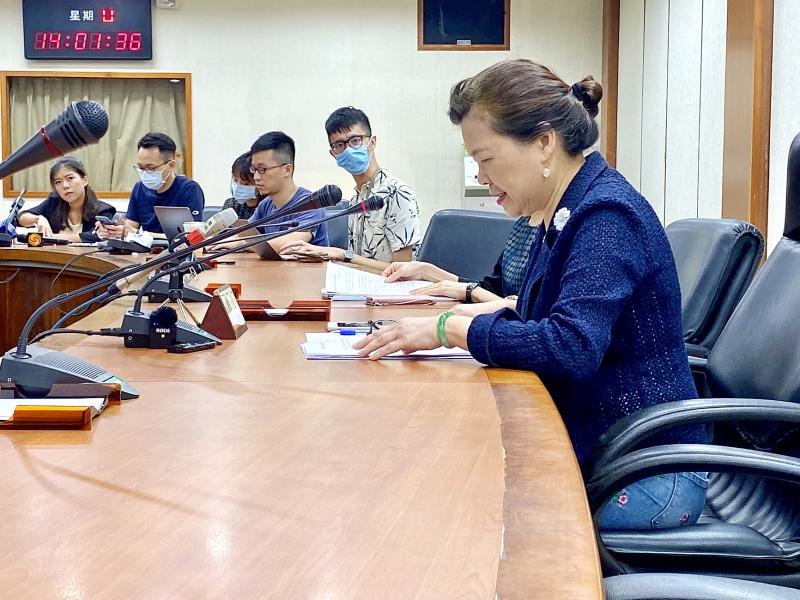Taiwan and the US are to start a formal dialogue after the two sides on Friday exchanged opinions on an array of issues, Minister of Economic Affairs Wang Mei-hua (王美花) told a news conference yesterday in Taipei.
A delegation led by US Undersecretary of State for Economic Growth, Energy and the Environment Keith Krach met with several Taiwanese officials to exchange views on economic prosperity, the US’ “5G Clean Networks,” supply chain realignment, strategy in the Indo-Pacific region, the New Southbound Policy, infrastructure, energy, investment review policies and women’s economic empowerment, Wang said.
Although the delegation maintained a low profile and held meetings with government officials behind closed doors, their exchanges were to prepare for a formal dialogue and pave the way for more specific discussions before reaching any concrete results, she said.

Photo: Huang Pei-chun, Taipei Times
The Taiwanese officials who attended the meeting included Wang, Vice Premier Shen Jong-chin (沈榮津) and Minister Without Portfolio John Deng (鄧振中), according to the Central News Agency.
The US delegation visited Taiwan between Thursday and Saturday to attend Saturday’s memorial service for former president Lee Teng-hui (李登輝), and interact with high-ranking officials and members of different sectors over various issues, the Ministry of Foreign Affairs said.
Although Friday’s talks were informal, it was an important step for Taiwan and the US, Wang said, adding that the atmosphere in the meeting was good.
The US delegation discussed the US’ “Economic Prosperity Network” initiative would start from the perspective of economic security and aims to promote the values of economic freedom, openness, transparency and fairness, while the clean network policy seeks to maintain network information security and protect personal information, Wang said.
The Taiwanese officials informed their US counterparts that all five of the nation’s telecom service providers have been listed as “Clean 5G” networks by the US Department of State, and that Taiwan did not use Huawei Technologies Co’s (華為) core equipment in its 4G deployment and would continue this approach with its 5G development, she said.
Regarding industrial supply chain realignment, Wang said the US delegation was told that Taiwan early last year started a policy to encourage Taiwanese businesses to repatriate capital and return operations to Taiwan in response to the US-China trade dispute.
The program has since attracted more than 200 Taiwanese firms to invest in the domestic market, she said.
During the meeting, the US delegation expressed an interest in Taiwan’s semiconductor ecosystem, she said.
Taiwanese officials told them about the advantages of the nation’s semiconductor industry, including its complete ecosystem from wafer manufacturing to packaging and testing, which makes Taiwan a reliable business partner in the global supply chain and has attracted foreign investment in the nation, she said.
Regarding investment review, Taiwanese officials introduced the delegation to the nation’s foreign investment review regulations, especially a separate review of Chinese capital, which received special attention from the US, she said.
The topic would be included in formal dialogues, she added.
Wang said that the exchanges were part of economic cooperation at a strategic level and each issue was led by the US State Department.
The two sides did not discuss a possible Taiwan-US bilateral trade agreement, as that would be handled through the Office of the US Trade Representative, she said.

Among the rows of vibrators, rubber torsos and leather harnesses at a Chinese sex toys exhibition in Shanghai this weekend, the beginnings of an artificial intelligence (AI)-driven shift in the industry quietly pulsed. China manufactures about 70 percent of the world’s sex toys, most of it the “hardware” on display at the fair — whether that be technicolor tentacled dildos or hyper-realistic personalized silicone dolls. Yet smart toys have been rising in popularity for some time. Many major European and US brands already offer tech-enhanced products that can enable long-distance love, monitor well-being and even bring people one step closer to

Malaysia’s leader yesterday announced plans to build a massive semiconductor design park, aiming to boost the Southeast Asian nation’s role in the global chip industry. A prominent player in the semiconductor industry for decades, Malaysia accounts for an estimated 13 percent of global back-end manufacturing, according to German tech giant Bosch. Now it wants to go beyond production and emerge as a chip design powerhouse too, Malaysian Prime Minister Anwar Ibrahim said. “I am pleased to announce the largest IC (integrated circuit) Design Park in Southeast Asia, that will house world-class anchor tenants and collaborate with global companies such as Arm [Holdings PLC],”

TRANSFORMATION: Taiwan is now home to the largest Google hardware research and development center outside of the US, thanks to the nation’s economic policies President Tsai Ing-wen (蔡英文) yesterday attended an event marking the opening of Google’s second hardware research and development (R&D) office in Taiwan, which was held at New Taipei City’s Banciao District (板橋). This signals Taiwan’s transformation into the world’s largest Google hardware research and development center outside of the US, validating the nation’s economic policy in the past eight years, she said. The “five plus two” innovative industries policy, “six core strategic industries” initiative and infrastructure projects have grown the national industry and established resilient supply chains that withstood the COVID-19 pandemic, Tsai said. Taiwan has improved investment conditions of the domestic economy

Sales in the retail, and food and beverage sectors last month continued to rise, increasing 0.7 percent and 13.6 percent respectively from a year earlier, setting record highs for the month of March, the Ministry of Economic Affairs said yesterday. Sales in the wholesale sector also grew last month by 4.6 annually, mainly due to the business opportunities for emerging applications related to artificial intelligence (AI) and high-performance computing technologies, the ministry said in a report. The ministry forecast that retail, and food and beverage sales this month would retain their growth momentum as the former would benefit from Tomb Sweeping Day